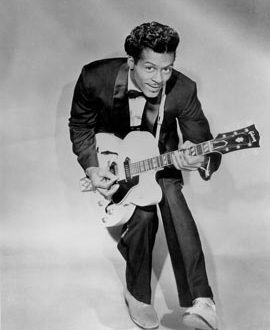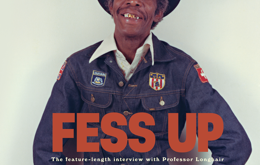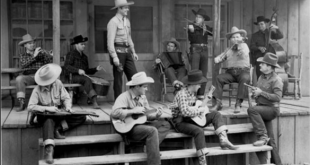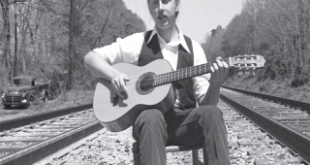“Whither goest thou, America, in thy shiny car in the night?”
-Jack Kerouac
“Our Father, Who art in traveling, hallowed drive Thy car, to kingdom come, on earth, if I can’t in heaven.”
-Chuck Berry (from The Autobiography)
“So what do you think about Bob Dylan getting the Nobel Prize for Literature?” The lady who put that question to me in October had known (and not liked) the newly-named Laureate Once Upon a Time in Greenwich Village.
“If they were going to give it to an American songwriter,” said I, “they should’ve given it to Chuck Berry.”
Why?
Well, because without…:
“Runnin’ to and fro, hard workin’ at the mill,
Never fail, in the mail, yet, come a rotten bill.”
…there could’ve been no:
“Johnny’s in the basement, mixing up the medicine, I’m on the pavement, thinking `bout the government…”
Dylan famously drank deep draughts of Woody Guthrie and Allen Ginsberg, but he also borrowed the irresistible cadences of Chuck Berry, who arguably ranks with Cole Porter as a songsmith who intuitively felt the interlocking dance of word, melody and rhythm that makes a song genuinely stand up and salute. Berry at his best was a shape-shifting poet journalist, singing from the viewpoint of a female teen (“Sweet Little Sixteen”), a put-upon working stiff (“Too Much Monkey Business”), a high school Everyman (“School Days”), a lovelorn Cuban (“Havana Moon”), a drag-racing motorhead (“You Can’t Catch Me”). Berry sculpted his lyrics and phrased vocally to deliver them with optimal punch. He wrote anthems for his sound (“Rock and Roll Music”) that didn’t take it too seriously. He could not, in the 1950s, shout “I’m Black and I’m Proud” as James Brown would a decade later, but he slyly made that point in the implied Jackie Robinson reference in “Brown-Eyed Handsome Man.” Like a great short story writer he knew the power of narrative and surprise endings (“Memphis”). He could be poetic (“…hurry-home drops on her cheek…”) without getting obscure. I’m sure the Nobel committee knew its literature prize would get more attention if offered to Bob Dylan instead of an obscure Norwegian playwright or any other stripe of brilliant but little-known writer. But I return to my initial reaction: If they wanted to honor a then-living American songwriter, Chuck Berry was the man.
News of Berry’s recent death (March 18th ) brought those thoughts back to me. The next morning National Public Radio interviewed a so-called pundit who called Berry the REAL father of rock `n roll (as opposed to Elvis). Wrong, wrong, wrong! You could say rock’s real fathers were Louis Jordan and Hank Williams, and that’s a lazy simplification, too. But Berry was a heap of things that contributed to rock’s evolution and succinctly voiced the zeitgeist of his era.
Before Elvis was called the Hillbilly Cat, meaning a country singer whose delivery was then deemed `black,’ Chuck Berry made a name for himself in East St. Louis clubs as a `black hillbilly,’ meaning he played and sang country songs for mainly black audiences. He took that to the bank with his first hit, “Maybellene,” which went #1 on Billboard’s R&B chart and made it to # 5 on the pop chart. Marty Robbins sang it for country fans, and all this happened in 1955, months before Elvis hit nationally. Does that make Berry the father of rock `n roll, then? No, because proto-rock sounds had been roiling about in country and R&B since the 1940s. No single individual or group should be crowned the V.I. Lenin of the rock revolution.
But it’s worth noting that the Hillbilly Cat and the Black Hillbilly emerged nationally at practically the same time. It may be argued that a spirited dialogue between American black and white cultures, particularly via music, has been perpetual, and is readily documented since the dawn of minstrelsy (circa 1840s). But by the 1950s Elvis and Berry were working in the hot spotlights of radio, television, national tours, and movies, all greatly amplifying their impact. The implication of their black-white blending on enforced segregation is obvious.
Less often noted is the strong `Latin tinge’ in Berry’s early recordings. The Mambo craze was just waning when rock first asserted itself, and Calypso was the popular `world music’ of the day. The verse section of “Rock and Roll Music” is set to a kind of comic rhumba, and the major thirds characteristic of Berry’s guitar lines strongly suggest Latin music. His unique Calypso blues, “Havana Moon,” was a major inspiration for another Latin-flavored R&B-to-rock anthem, Richard Berry’s “Louie, Louie.” (Other than musically, the two Berrys were not related.)
A few days after Berry’s death, I was on a flight offering sundry audio distractions from my cramped econo-class seat. I chose a compilation of Berry’s hits, and my shoddy headphones forced me to notice a feature of Berry’s sound: the trebly pitch of most of his guitar lines and of the recordings in general. That’s not true of the first, “Maybellene,” where his guitar barks and growls with classic tube amp distortion. Was the change to a cleaner (albeit tinnier) sound a conscious one? I suspect it was, and I submit that Berry or his engineer at Chess opted for that in deference to the means by which much of his music was heard: transistor radio. Anything not trebly tended to turn to mud when heard on transistor radios.
There’s no separating Chuck Berry from his era’s technology; it played major roles in his songs. Jukeboxes were vehicles of musical liberation: “…long as she’s got a dime, the music won’t never stop” (“Roll Over, Beethoven”). A seat belt became a comic foil in “No Particular Place to Go.” Telephones and long distance operators became characters in “Memphis” and “Promised Land.” But no technology played as big a part in Berry’s world as the automobile. He was the uncrowned road laureate of the Eisenhower era.
In 1956, President Eisenhower signed the Federal –Aid Highway Act into law. This inaugurated a 41,000-mile `National System of Interstate and Defense Highways’ aimed at enabling “speedy, safe transcontinental travel.” Ike’s ambitions for more and better roads went hand in glove with the car-centric aspirations of millions of Americans enjoying the fruits of post-WWII prosperity. It was a time of car clubs, motorheads and drag races, and high time for the songs of Chuck Berry, who had been prepping for that moment all his life. In his autobiography, he writes of his first car during his high school years: “I was proud to get the prestige and popularity of being only one of eighteen students driving to school and one of only two who actually owned their cars.” Cars are plentiful in Berry’s book, and in his songs, too.
He buys a car in “No Money Down” and flies one in “You Can’t Catch Me.” Races are recurring themes, from his debut song, “Maybellene,” to a revision of that nearly a decade later as “Nadine (Is That You?).” The `50s Ford and Cadillac race became, in the `60s, a cab chase. You don’t have to be very Freudian to read something into the elusive women in these songs and the cars hotly pursuing them. There are even rare moments when Berry suggests something Jungian, or at least mysterious. What did he mean when he sang in “Maybellene”: “The motor cooled down, the heat went down, and that’s when I heard that highway sound.”
That highway sound?
What was that?
A sonic epiphany?
Berry never explained that, and odds are he wouldn’t if he were still around to ask. One of the many lessons to be learned from Chuck Berry is that being a genius does not necessarily make you a likable guy. Just ask Rolling Stone Keith Richards: he grew up idolizing and imitating Berry, but after one encounter too many with His Eminence, quipped: “I wouldn’t warm to Chuck Berry if he was cremated next to me.”
 Baja Review A community newspaper serving Ensenada, Valle de Guadalupe, and Rosarito in Northern Baja California
Baja Review A community newspaper serving Ensenada, Valle de Guadalupe, and Rosarito in Northern Baja California





